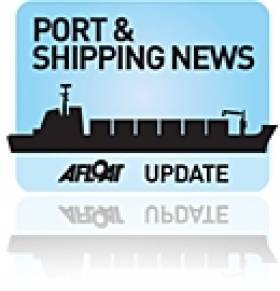Displaying items by tag: Maritime Institute of Ireland
Lecture: “The Newfoundland Voyage”
All are welcome, bar and refreshments and a voluntary contribution is appreciated. Further lectures will be held throughout the winter, mostly on the third Thursday of each month and in the Stella Maris. Note that the March lecture is due to be held on the 'fourth' Thursday of that month.
For further information about lectures and updates on the M.I.I's maritime museum in Dun Laoghaire, log on to www.mariner.ie
Lecture: "Historical Diving in Ireland"
The Maritime Institute of Ireland (M.I.I.) hosts a Winter /Spring lecture series. The first lecture of the new year is 'Historical Diving in Ireland' by Dr Edward Bourke.
The lecture is on 20 January and starts at 8pm and is to be held in the Stella Maris Seafarers' Club, Beresford Place. The club is located beside Busaras and faces opposite the rear of the Customs House. Nearby is the Irish Life Center (ILAC) which is convenient for car-parking and buses, the 'Red' Luas (Busaras stop) and DART stops at Connolly /Tara St. stations.
All are welcome, bar and refreshments and a voluntary contribution is appreciated. Further lectures will be held throughout the winter, mostly on the third Thursday of each month and in the Stella Maris. For further information about lectures and updates on the the M.I.I's maritime museum in Dun Laoghaire, logon to www.mariner.ie
Maritime Museum Seeks Volunteers
Over the last three years the museum has been closed for major restoration to the historic building which in fact is the greatest artefact on display. The museum is believed to contain the largest maritime collection of artefacts in Ireland.
For further details please contact Breasal O Caollai, Hon. Secretary Mob: 086-0745402 Email [email protected] and www.mariner.ie
Remembering Seafarers Who Saved the Nation
City Quay in the centre of Dublin can be a cold place when the wind whips upriver from the open sea.
There was a 'bite' in the wind as I stood there in late November last year, recording the sounds of remembrance. Men, women and children stood in front of a monument where, on most days, traffic pours past and the great majority of people in those vehicles may not realise they are passing a hallowed spot which remembers men without whom this nation would have ground to a halt. This nation may be in a state of "economic war" at present, it was in a real state of war when those men died.
Every year, on the second last Sunday of November, this gathering takes place, when the men of the Irish mercantile marine who lost their lives at sea during the Second World War are remembered. Mass is celebrated in the City Quay Parish Church. Then there is a short walk to the Seamen's Memorial where wreaths are laid. That is followed by tea, coffee and a chat in the parish hall where it is a time of memories for former seafarers and their families. Friendships are renewed as the "family of the sea" gathers. In the afternoon, there is another Memorial Service St. Patrick's Cathedral.
These are poignant occasions which, in recent years, have been extended to embrace, remember and honour all Irish seafarers who have died at sea. The Maritime Institute of Ireland organises the event. Its Cork Branch also holds a remembrance service in November.
The month of November is an important one in the history of Irish maritime affairs.
It was on November 14, 1984 that the then Irish Government, a Fine Gael/Labour Coalition delivered a shattering blow to the Irish maritime industry. They put the national shipping company, Irish Shipping, into liquidation.
Those who took that decision have since put distance between themselves and the maritime sector. Garrett Fitzgerald was Taoiseach; Alan Dukes was the Minister for Finance in the Fine Gael/Labour Coalition Government which made that controversial decision, putting the first Irish State company into liquidation. Seafarers who had rallied to the call to help save the nation when the company was set up in World War Two were abandoned to their fate. Politicians did not want to remember that, at a time when neutral Ireland was being denied vital supplies by warring nations, seafarers saved the nation from disaster. The politicians who ruled the nation in 1984 abandoned them.
Shortly after they abandoned Irish Shipping, the Government was quick to rescue Allied Irish Banks and protect shareholders over the consequences of rash investment in insurance. Banks were more important than seafarers. It seems that not a lot has changed today in the attitude the Government takes towards banks, in comparison with the way it treats the people of this island nation.
• The Annual National Commemoration Services for Irish Seafarers will be held at 11.30 am this Sunday, November 21, in the Church of the Immaculate Heart of Mary, City Quay, Dublin. Wreaths will be laid afterwards at the Irish Seaman's National Memorial on City Quay. There will also be a memorial ceremony of Evensong at 3.15 pm in St. Patrick's Cathedral, Dublin.
• This article is reprinted by permission of the EVENING ECHO newspaper, Cork, where Tom MacSweeney writes maritime columns twice weekly. Evening Echo website: www.eecho.ie
READ MORE ISLAND NATION BLOGS HERE
Lecture on Kish Wreck Bolivar
The lecture starts at 8pm and is held in the Stella Maris Seafarers' Club, Beresford Place and is located beside Busaras and faces opposite the rear of the Customs House. The club is also close to the Irish Life Center (ILAC) which is convenient for car-parking and buses, the 'Red' Luas (Busaras stop) and DART at Connolly /Tara St. stations.
All are Welcome, bar and refreshments and a voluntary contribution is appreciated. Further lectures will be held throughout the winter, mostly held on the third Sunday of each month and in the Stella Maris. For further information, Maritime Institute of Ireland (M.I.I.) website www.mariner.ie
Model Boat Show at Poolbeg YC
As part of Heritage Week 2010, tomorrow (Sunday 29 August) there will be an exhibition of model-boats held in the Poolbeg Yacht Club, Pidgeon House, Dublin 4 (near the East-Link toll bridge). There will be approximately thirty models of various types on display including a metre-long working submarine. In addition there will be a talk by Gary Mooney, Secretary of the Irish Model Boat Club. The free event starts at 2.30pm and is organised by Barney Yourell of the Maritime Institute of Ireland. For information on events nationwide www.heritageweek.ie
Dundalk hosts Merchant Seamen Exhibition
The photographic collection feature over 350 identity cards of Dundalk men who served in the merchant navy between 1918-1921. The cards include personal details, foreign voyages and most importantly, a passport style photo of each seaman.
The exhibition also provides an insight into the history and nature of maritime activity in Dundalk, noting the contributions of several families in the area, as well as highlighting the fate of the SS Dundalk sunk by a U-boat in October 1918.
An accompanying 24-page booklet has also been produced. For further information and copies of the booklet are available from the County Museum or may be downloaded from the website www.dundalkmuseum.ie Admission to the exhibition is free.



































































